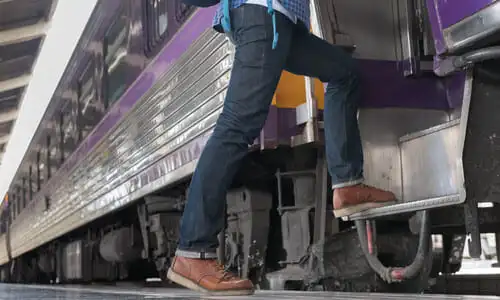
Trains are near-inseparable from American history. They formed the backbone of transportation infrastructure long before the automobile, and even today, they remain the most efficient form of land-based mass transportation in the country.
With so much riding on trains – pun intended – a single accident can have crushing results. From passengers to pedestrians and from the train company to the crew, anybody even remotely involved in the accident stands to lose something.
The thing is, more than one railroad accident happens each year.
The Federal Railroad Administration reported an average of 8972 train accidents per year over a five-year period from 2017 to 2021. These tragedies have left a grand total of 3416 people dead and 27,883 people injured.
Despite modern railways having a better safety record than cars, each train accident that does occur is likely to have far more serious repercussions than the average car crash. So if you end up in an accident involving a train, you’re going to need support for any hope of recovery.
This is where our train & railroad accident attorneys come in. Call Valley Law Accident and Injury Lawyers at 801-810-9999, or fill out our online form today for a no-cost case evaluation.
Whether you need compensation from your insurance provider or justice by holding a liable party accountable for the accident, Valley Law is here to help.
Choosing the Right Salt Lake City Train & Railroad Accidents Attorney
After a train accident, you might have injuries that need tending to. You may have damaged property, including any important luggage, if you were a passenger or your car if you were a driver at a crossing.
Once you’re out of harm’s way, you’ll have to start searching for avenues through which you can recover damages.
Working with an expert attorney gives you several advantages in this search. They can represent your interests at the negotiation table, handle the entire claims process for you so you don’t get duped, and take your case to court if necessary.
But if every lawyer out there offers the same services, how do you know you’re picking the right one? Especially with the stakes after a train accident, what should you look out for when hiring a lawyer to ensure you get the best outcome for your case?
Experience & Record
Well, the first thing you ought to ask about is your lawyer’s experience and history. You might be able to trust relatively green lawyers with small claims, but the more money that is on the line, the more you’d prefer a veteran in the field.
Lead Attorney Brigham Richards brings over a decade of experience to Valley Law. That is ten years of specialization in injury law, including train and railway accidents.
Communication
Every lawyer is expected to know what they are talking about, but not every lawyer is good at talking. You want a legal representative who can articulate the complexities of the case to you, your insurance company, and, if necessary, to the liable party.
But communication doesn’t just stop with the technical ability to verse thoughts. A good lawyer takes it upon themselves to keep you informed every step of the process.
You want an attorney who is proactive when it comes to communication. That means they do not sugarcoat bad news, nor do they delay progress reports just because they did well and have time to spare.
They have to be honest about any information they deliver and, within reason, be easy to reach. They are never more than a phone call or email away.
At Valley Law, we take pride in our personal approach. Hence, our slogan is “We take it personally.”
We base our practice on the philosophy of responsibility to our clients. That means we keep you involved, keep you informed, and keep your interests first.
Compensation
Different Salt Lake City personal injury lawyers have different rates. Some charge by the hour, some have flat fees, and some work for retainer fees they use to pay for their expenses.
Of course, each form of compensation has its own advantages and disadvantages. Valley Law prefers to work for our clients on a contingency fee basis, meaning we only get paid if you win.
Hourly Rates
Hiring an attorney with an hourly rate usually means you have more control of their time and have the advantage of being able to track your expenses as the case moves along. It also means when you have a strong case, you spend less as it resolves faster.
The problem with hourly rates, however, is that the lawyer isn’t really incentivized to get things done quickly. Situations can also arise where your lawyer might be waiting for communication from involved parties on the clock, meaning there are hours when you pay for nothing.
Flat Rates
Clients hiring lawyers who work for flat rates have the advantage of knowing exactly how much they are paying, which is useful on a budget. The amount doesn’t change regardless of the complexity of the case.
The issue with this is you don’t have as much control over your lawyer’s time and activities. After all, how could you when your case is worth as much to them as anyone else’s, regardless of how strong or difficult it is?
Your lawyer might end up juggling multiple cases at once, ultimately to your detriment.
Retainer Fees
Retainers are fixed amounts that pay for the expenses and fees of the case as your lawyer works. There is security in this because the money is held in a trust account, which means your lawyer cannot access it for personal use, and any excess from a retainer fee returns to you.
Despite this convenience, retainer fees face a major problem: they do not guarantee that you will win the case. This, combined with complex cases costing more, means you stand to lose money if your claim doesn’t go your way.
Contingency
Contingency means your lawyer only gets paid if you win your case, typically for a percentage of the amount you recover.
We prefer this approach at Valley Law because it incentivizes us to do our best to get you the highest possible amount from an injury claim. Under a contingency fee, when we win, so do you.
What Causes Train & Railroad Accidents?
Trains are massive, complex machines comprised of intricate interacting systems. There are almost an uncountable number of specific potential reasons for something to go wrong and for an accident to happen.
And yet brilliant engineering prevents most of what can go wrong from going wrong. This allows us to narrow down the causes of train accidents that do occur so they fall under one of several general categories.
Keep in mind this list does not encompass all causes of accidents but accounts for the most common.
Crew/Operator Negligence
Crew/Operator negligence is one of the most common causes of train accidents, often present even when other factors are at play.
In 2017, a train in Washington State derailed, killing three passengers and injuring 57 more passengers and crew. The National Transportation Safety Board (NTSB) found detailed complacency in their final report of the crash, which led to the derailment.
In this case, the train engineer failed to slow down in low-visibility conditions. However, other accidents may occur due to negligence of people besides those on the train.
For example, in 2016, two trains met in a head-on collision in Bad Aibling, Germany, because of a dispatcher playing a video game while working. Meanwhile, in 2019, three men fleeing a fender bender in Long Island, New York, caused a derailment by going around the crossing gate.
The last example led to the death of three people and the injuries of seven more, serving as an example of the dire consequences of irresponsibility in the face of safety practices.
Human Error
While not as egregious as negligence, accidents caused by human error are just as tragic.
In 2015, an NYC-bound Amtrak train from Philadelphia derailed when the driver was momentarily distracted and confused by another train’s radio chatter. This caused him to accelerate beyond the safe speed at a junction, derailing the train.
The NTSB found no fault with the engineer.
Weather Conditions
Difficult weather conditions can set the stage for human error, negligence, or mechanical failure to lead to a derailment. For instance, heavy fog can lower visibility, while rain, sleet, or snow can make it difficult to maintain safe speeds on a track.
Once the conditions are in place, all it takes is an instigating moment for a chain reaction to begin and an accident to happen.
Mechanical Failure
Mechanical failure is closely tied to negligence.
Sometimes, a fluke happens, and a faulty piece of equipment fails, leading to an accident. But most of the time, mechanical failure can be avoided via rigorous maintenance procedures and redundancies.
It is the responsibility of assigned personnel to ensure the safety of the equipment under their care. Public transportation staff and crew who fail to do this can be held liable for an accident should one occur.
Work With Our Expert Salt Lake City Train & Railroad Accident Law Firm Today
If you’re looking to pull your life back together after a train accident, we have the services you need. Our attorneys at Valley Law Accident and Injury Lawyers have the expertise you need to fight for your interests and get you the greatest possible amount of compensation for your claim.
Call us today at 801-810-9999 and get a zero-cost, no-obligation consultation with us. Alternatively, you can also contact us online by filling out our online form.



